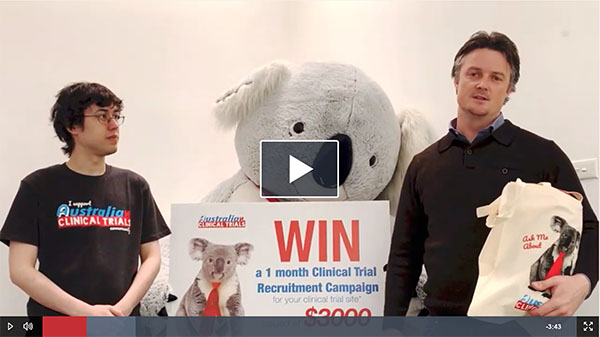
5 Ways to Discover Local Clinical Trials
The process of finding a clinical trial can be a tricky task if you don’t know where to look. There are many great resources for finding studies which remain relatively unknown! When searching for clinical trials, there are also a few aspects that should be kept in mind. Most importantly, if you want to participate in a trial, you have to think locally as finding a great trial will do you no good if you can’t travel to its location (aside from medical tourism, which will be discussed in a future blog)! You will also want to find a trial where your characteristics match what the clinical trial requires. For example, if you are in good health or have a specific illness, or being of a certain age, gender, or ethnicity are all potential aspects a clinical trial may require. To find and filter trials for these specific characteristics is exactly why it is important to know about all your possible options when finding clinical trials.
Updates from public registries and databases
Clinical trial databases (also known as a registry or register) are country specific and the primary resource for anyone searching through currently running clinical trials. It is important that these databases are complete, searchable, and up-to-date, as both interested participants and clinical trials have specific requirements that must be met before participation can occur. The global ethos over the last 10 years has been to make clinical research more transparent. Some journals require that clinical research articles must have registered the associated clinical trial. What that means for you is public registries are mostly complete, making them ideal to search through. There is at least one primary registry for most countries (and sometimes continents) all over the world. A list of these can be found here on the World Health Organisation’s (WHO) website. This video provides a brief overview of how to search through these registries.
If you are based in Australia or New Zealand, or are just curious about clinical trials down under, your first stop should be the Australian New Zealand Clinical Trials Registry (ANZCTR). The ANZCTR is the primary registry for this region, and also takes information about Australian trials from the American Government registry. The ANZCTR can be searched by location, recruitment status, and, of course, keywords in the title or description. This may be the ideal place to start searching for clinical trials in Australia, although the information presented for each trial may be more than what you require. However, don’t be overwhelmed or discouraged. This video briefly demonstrates how you can effectively search the ANZCTR.
A complementary source of information for clinical trials is our website, Australian Clinical Trials. Trial staff may choose (but have no obligation) to post and manage trial listings here, meaning any trial you find on Australian Clinical Trials should be both current and accurate. You can search these listings by recruiting status, geographic location, title, description, and your own characteristics (gender, age, illness, and so on). The information of each trial is featured on each individual page in a friendly and easily accessible way through the text, pictures, and videos. Importantly, the location of the trial can be viewed directly on the page using Google Maps. An in-line contact form streamlines the process of applying for a trial – all you need to do is fill it out and a notification will be sent to those running the trial.
These websites often allow you to sign up for new trial notifications as they are posted. This sidesteps the process of searching through a database every week if you want to stay up to date. You can sign up for notifications from Australian Clinical Trials, which can be done from the main page (see “Get notified of new clinical trials”). You can also get email notifications on the Australian Government website, which syncs with the ANZCTR registry to get the latest, currently recruiting clinical trials. Google also has a system where you can sign up for alerts on any topic you wish. This includes clinical trials in general, or those that focus on a specific illness. For help configuring and using Google Alerts effectively, view this video.
Illness specific support institutions
If you are searching for clinical trials targeted towards specific illnesses, specialised institutions and community groups may be able to point you in the right direction. These illness support groups are often well informed and eager to aid both you and the trials they support. Clinical trials requiring a specific illness almost always have a shortage of participants, and are very grateful to hear from any potentially interested volunteers. If you are unsure whether or not an illness has a related group, the Australian Government website is a good first stop as it contains a searchable list of links to many community-based, disease specific support websites.
Social media groups and networks
Support groups pages and communities also exist on social media websites like Facebook, Instagram, Twitter, and others. There are community hubs and posts for almost every topic on these sites, and are updated regularly. Due to the timely nature of these platforms and interested users, they are an excellent place to get help finding clinical trials. If you are not already using them in this manner, you might be surprised to see how a familiar platform can help you in a new way! It is not uncommon for these interest groups to be further ahead of the companies running the trials when it comes to advertising and clinical trial exposure. By joining and participating in these groups, you can find trials for yourself, and help others find trials too!
As a big part of clinical trials is the community surrounding it, it makes sense to join an existing community group and help it grow! Online social platforms make it very easy to find and connect people with similar interests or illnesses. If you notice a gap in support for your specific illness, you and others can even try starting your own community! You may have to in order to help the next person in your position who is looking for the same information as you. In doing so, it could have a big impact on advancing medical research and participant recruitment!
Doctors, pharmacists and other healthcare professionals
There are many people available and willing to provide guidance on finding clinical trials. You may be informed about, or be provided with other resources that match up volunteers with clinical trials. Think about who might be involved with clinical trials based on their profession and interests. For example, some doctors and specialist health providers may be assisting in the assessment of volunteers, or a trial might be run in their clinic. Similarly, some pharmacists might be involved with drug preparation or dispensing for clinical trials. However, it is a fact that not all doctors and/or pharmacists are aware of clinical trials nor where to find them. If you meet one that is unable to assist you, please let them know about the Australian Clinical Trials blog and any other resources that you have found useful!
Recruitment posters may also be posted in or around the places where these professionals work. Check clinics, hospitals, and practices for adverts that will almost certainly be for local trials. Similarly, you can browse any community noticeboards you come across, like those found at local libraries or universities. For studies recruiting participants that may not be familiar with the internet, this may be the best way to reach them. Take advantage of this! While it may seem old fashioned, you may be able to find some trials easier this way rather than online.
Companies and their published articles
Another option is to directly contact companies running clinical trials, which are often referred to as “Sponsors”. These Sponsor companies can be directly contacted using details provided on their website or registry listings, and as such you should not hesitate to contact them. You can sometimes find relevant companies by searching for products relevant to your interests. You should be able to get an understanding of their active clinical trials for future products under their “R&D pipeline” tab on their websites. However, be aware that there can be confidentiality and privacy issues surrounding clinical trials that can make some companies hesitant to directly engage with potential participants.
Companies may publish their research once a clinical trial has concluded. If you are interested, you can read about these findings, which may lead you to the researchers or companies involved in currently recruiting clinical trials. A good place is viewing online press releases on company websites. Science magazines will often report major findings, although clinical trials news can sometimes be sparse. Further material can also be found easily using scientific article search engines like Google Scholar, PubMed and ScienceDirect. These contain many free articles, but for paid access articles you can ask your local library (or university, if you are currently studying) if they have any subscriptions to scientific journals.
There are many ways to find clinical trials, and you’ve just completed the hardest step: realising that these resources exist! Equipped with the knowledge and experience, finding clinical trials can be an enjoyable process! Do you have any other ideas, suggestions, or stories about finding clinical trials? Tell us in the comments below or contact us.


